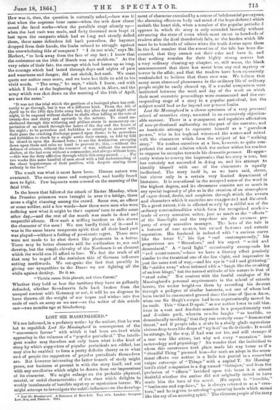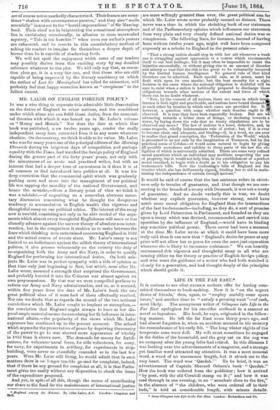LOST SIR MASSINGBERD.* WE are informed, in a prefatory notice
by the author, that he was led to republish Lost Sir Massingberd in consequence of the "uncommon favour" with which it had been rec-ived while appearing in the columns of a "popnlar periodical." The intelli- gent reader may therefore not only learn what is the kind of story by which supporters of popular periodicals are edified, but may also be enabled to form a pretty definite theory as to what sort of people the supporters of popular periodicals themselves are. But however interesting the latter branch of study might prove, our business at present is with the story itself, and not with any corollaries which might be drawn from our impressions' of its character. We might enlarge on the probable physical, . mental, or social characteristics of the class which delights in weekly instalments of horrible mystery or mysterious horror. We might attempt to investigate the subtle influences on the develop-
* Lost Sir Massingerd. A Romance of Real Life. Two vols. London: Sampson Low, fi.m, and Marston. 1861. ment of character exercised by a course of hebdomadal paroxysms, the alarming effects on body and mind of the hope deferred which maketh the heart sick, when a number of the popular periodic 11 appears in which the story is only extended laterally without advancing the state of coma which must enume in hundreds of readers after the final thunderbolt falls, or the burden which life must be to hundreds of others when the truth dawns upon them in the final number that the se.nsation of the tale has been dis- counted, that they cannot eat their cake and have it, and that nothing remains for their highly strung nerves but a very ordinary clearing-up chapter, or, still worse, the blank announcement that there has never been any real mystery or horror in the affair, and that the readers have been excessively weakmiuded to believe that there ever was. We believe that many most abnormal phenomena in the ordinary life of ordinary people might be easily cleared up, if a careful comparison were instituted between the week and day of the week on which their most eccentric proceedings were commenced and the cor- responding stage of a story in a popular periodical, but the subject would lead us far beyond our present limits.
Lost Sir Massingberd is a clever specimen of a very prononei school of sensation story, narrated in an excessively objection- able manner. There is a transparent and repulsive affectation of non-professional authorship on the part of time narrator, and au inartistic attempt to represent lihnself as a " garrulous person," who in his boyhood witnessed the scenes and mixed with the characters which form the subject of his " striking story." We confess ourselves at a loss, however, to quite com- prehend the actual relation which the author wishes his readers to suppose he occupies towards his dramatis personx. lie appar- ently wishes to convey the impressioa that his story is true, but has certainly not succeeded in doing so, and his attempt to identify himself with 0113 of the characters is equally ineffectual. The story itself is, as we have said, clever, but clever only in a certain very limited department of literature. It is sensational in the accepted sense of the word to the highest degree, and its cleverness consists not so much in any special ingenuity of plot as in the creation of an atmosphere of vague dread, doubt, and suspicion through which the events and characters which it encircles are exaggeratel and distorted. To a great extent, this is effected m2rely by a skilful use of the ordinary conventionalities which form the recognized stock-ir- trade of every sensation writer, just as much as the " effects " of the lime-light and the trap-door are the common pro- perty of every sensation manager. The hero of the tale is a baronet of vast estates, but ruined fortunes and satanic reputation. His forehead is indented with " a curious curve like the letter U;' his lips " curl contemptuously," his proportions are " Herculean," and his aspect " weird and demoniacal." A " lurid light" occasionally overspreads his "evil countenance,"—here we have a literary effect precisely similar to time theatrical one of the Env-light, and impressive in just the same sort of way,—and his eye is "coil and glittering." He "strides away" when irritated with a "laugh like the creaking of an iron hinge," but the normal attitude of his nature is that of "cruel calm." Not content with the fearful catalogue of Sir Massingberd's personal acquirements in the school of satanic heroes, tho writer heightens them by recording his descent through a pedigree of similar baronets, not one of whom had bean buried in consecrated gronnd since the time of Queen Anne, when one Sir Hugh's corpse had been supernaturally moved in its vault. This " Giant Despair," as our author loves to call him, lives in a vast and desolate mansion in a proportionately vast and desolate park, wherein re-echo laughs "so terrible, so demoniacally mocking,' that they can scarcely come "from mortal throat," and if people take a siesta in a shady glade mysterious visions drop tears like drops of " icy hail" on their cheeks. It would be strange, by the way, if hail was not ice, and still stranger if a tear was like either, but why not carry sensation" into metereology and physiology ? No wonder that the individual to whom this occurrence took place made his way home as if a "dreadful Timing" pursued him—for such an adept in the sensa- tional effects our author is a little too partial to a somewhat vulgar entourage of " Timings " with a capital T. Sir Massing- herd's chief companion is a dog named " Grimjaw," and from the profusion of " effects " lavished upon this beast it is almost doubtful whether the author did not originally intend to have made him the hero of the novel. His aspect is " horrible," "loathsome and repulsive," he is always referred to as a " crea- ture," and he is given to uttering" quavering howls winch sound like the cry of all accusing spirit." The virtuous people of the story
are of course not so markedly characterized. Their frames are some- times" shaken with contemptuous passion," and they also" smile scornfully" in answer to the "horrid imprecations" of Sir Massing- berd. Their chief use in heightening the sensational atmosphere lies in exclaiming occasionally, in allusion to some unrevealed mystery, "This is too horrible r when even our author's powers are exhausted, and he resorts to this unsatisfactory method of asking his readers to imagine for themselves a deeper depth of horror than be is capable of shadowing forth.
We will not spoil the enjoyment which some of our readers may possibly derive from this exciting story by any detailed reference whatever to the plot. We will only say that, as sensa- tion plots go, it is a very fair one, and that those who are still Capable of being impress'A by the literary machinery on which the author of Lost Sir Massingberd has relied for attraction, will probably feel that happy sensation known as " creepiness " to the fullest extent.































 Previous page
Previous page